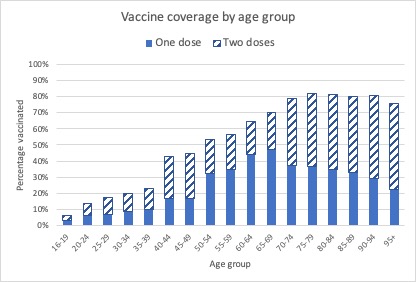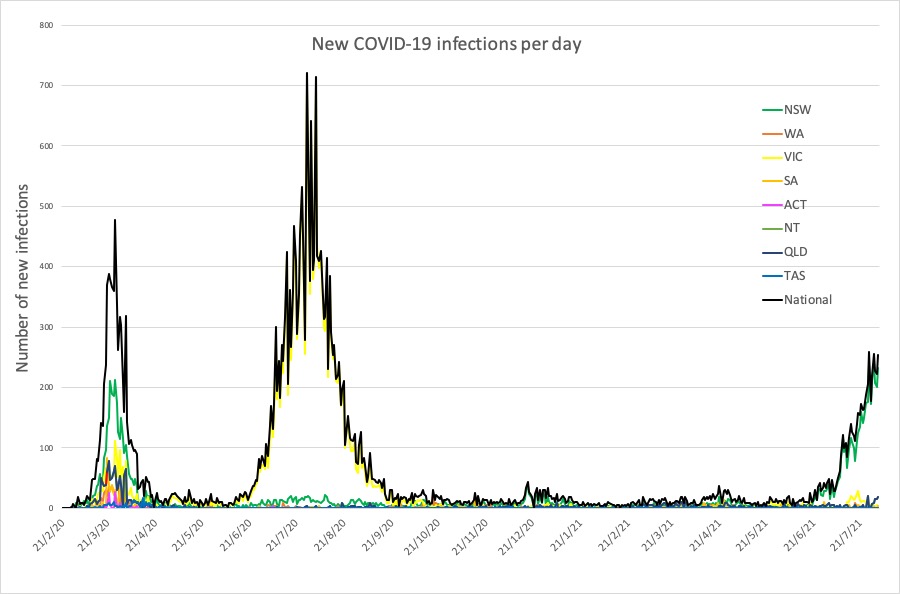And doctors can promote and encourage covid vaccination, as long as they don't play favourites with vaccine types, TGA says.
Welcome to The Medical Republic’s COVID Catch-Up.
It’s the day’s covid-19 news in one convenient post. Email bianca@biancanogrady.com with any tips, comments or feedback.
5 August
- Study suggests mRNA-vaccine-linked myocarditis and pericarditis affect different age groups and present at different times.
- Doctors can advertise and promote covid vaccines, just not by name or ingredient, TGA says.
- Newcastle/Hunter region gets snap lockdown from midnight tonight after five cases diagnosed.
- Five more covid deaths reported in NSW yesterday, none of whom were fully vaccinated.
- No increase in stillbirth or preterm birth seen in Canada during pandemic.
- The latest data from the covid vaccination rollout.
- The latest covid infection numbers from around Australia.
Myocarditis and pericarditis associated with mRNA covid vaccines present slightly differently, but so far no fatalities or severe outcomes have been reported for either, research suggests.
A study published in JAMA identified 20 cases of myocarditis and 37 cases of pericarditis from more than two million covid vaccine doses administered across forty hospitals in the US.
Myocarditis presented a median of 3.5 days after vaccination, and was significantly more common after a second dose than first dose, the study found. Three-quarters of those diagnosed with it were male, and with a median age of 36. All but one were admitted to hospital, and discharged within two days.
Two of the patients who developed the syndrome after their first dose of vaccine went on to receive a second dose without a worsening of symptoms.
Pericarditis presented later – a median of 20 days after vaccination – and the median age of those affected was 59 years. Again, three-quarters were male, but only one-third were admitted to hospital – none to intensive care – and none stayed longer than two days.
Doctors can create their own advertising materials for covid vaccines, as long as those materials don’t promote a specific vaccine by name or ingredient, or make any statements about the relative merits of different vaccine types.
The Therapeutic Goods Administration has reiterated its 2021 policy on healthcare providers and others advertising or promoting covid vaccines, which also allows for healthcare providers to offer incentives for vaccination.
Stay-at-home orders will be in place for the Newcastle and Hunter Valley area from midnight tonight and for at least seven days, after five cases of covid were reported in the area yesterday.
The news follows the discovery of high levels of SARS-CoV-2 viral RNA in sewage in the area the previous day. The cases are linked to a cluster on the Central Coast.
The restrictions are the same as those that apply to Greater Sydney: people must stay home unless for an essential reason, and no home visitors are permitted.
The order applies to Newcastle, Lake Macquarie, Maitland, Port Stephens, Singleton, Dungog, Muswellbrook and Cessnock.
Sewage testing has also detected viral fragments in Armidale, Dubbo, Woy Woy and Castle Hill, none of which have known active cases of covid.
Five lives have been lost to covid in NSW in the 24 hours to 8pm last night, adding to the two deaths the previous day which included a 27-year-old man.
The grim tally includes three people in their 60s. Four of the five deaths were in unvaccinated individuals, and the fifth had only received a single dose more than three months ago.
Canada recorded no significant change in the rates of stillbirth or preterm birth during the pandemic in 2020 either overall or in specific subgroups of individuals such as those living in rural areas.
A paper published in the Canadian Medical Association Journal reported the analysis of stillbirth and preterm birth rates from July 2002 to December 2020, which showed no change in the rates during the period from January to December 2020 compared to previous years.
The overall stillbirth rate was 0.56% and the preterm birth rate was 7.96% for the entire study period, and the period of the pandemic was within the range observed over previous years.
The authors noted that some studies have found a rise in the rates of stillbirths while others have found declines in preterm births during the pandemic.
“The effects of pandemic-related mitigation measures and compliance with them could have differential effects in regional and local settings. In some areas and in certain people, the restrictions could have had beneficial effects; in other areas or people, they may have been counterproductive,” they wrote.
One in five Australians over the age of 16 years have now received two doses of a covid vaccine, according to the latest figures on the vaccination campaign from the federal health department.
The data shows that 20.8% of those eligible have received two doses, 29.3% of those aged over 50 years and 44.8% of those aged over 70 years have been fully vaccinated.
The fastest growing age group to have received at least one dose is those aged 40-44 years, which has seen a 20 percentage point increase in one-dose coverage since the start of July.
Here’s a breakdown of one- and two-dose coverage by age:

Here are the latest covid-19 infection numbers from around Australia to 9pm Wednesday:
National – 35,087 with 925 deaths
ACT – 124 (0)
NSW – 9793 (232)
NT – 198 (0)
QLD – 1859 (19)
SA – 866 (3)
TAS – 234 (0)
VIC – 20,955 (0)
WA – 1058 (0)



